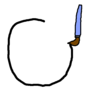imported>SumisuAirisu (Undo revision 70847 by Aaaefafaefaw (talk)) |
imported>Turkeymike No edit summary |
||
| Line 15: | Line 15: | ||
==History== | ==History== | ||
In the late 18th and 19th centuries, the philosophy of humanism was a cornerstone of the Enlightenment. Human history was seen as a product of human thought and action, to be understood through the categories of "consciousness", "agency", "choice", "responsibility", "moral values". Human beings were viewed as possessing common essential features. From the belief in a universal moral core of humanity, it followed that all persons were inherently free and equal. For liberal humanists such as Immanuel Kant, the universal law of reason was a guide towards total emancipation from any kind of tyranny. | |||
Criticism of humanism as over-idealistic began in the 19th century. For Friedrich Nietzsche, humanism was nothing more than an empty figure of speech – a secular version of theism. Max Stirner expressed a similar position in his book The Ego and Its Own, published several decades before Nietzsche's work. Nietzsche argues in Genealogy of Morals that human rights exist as a means for the weak to constrain the strong; as such, they do not facilitate the emancipation of life, but instead deny it. | |||
==Personality and Behaviour== | ==Personality and Behaviour== | ||
Revision as of 00:31, 9 April 2021
 |
Stub Article "Help" - Still-Being-Drawnism This page is a stub. You can help FreePCB by expanding it. |
Anti-Humanism is the belief that humanity is undesirable and should be done away with, usually either by going extinct or becoming something else.
History
In the late 18th and 19th centuries, the philosophy of humanism was a cornerstone of the Enlightenment. Human history was seen as a product of human thought and action, to be understood through the categories of "consciousness", "agency", "choice", "responsibility", "moral values". Human beings were viewed as possessing common essential features. From the belief in a universal moral core of humanity, it followed that all persons were inherently free and equal. For liberal humanists such as Immanuel Kant, the universal law of reason was a guide towards total emancipation from any kind of tyranny.
Criticism of humanism as over-idealistic began in the 19th century. For Friedrich Nietzsche, humanism was nothing more than an empty figure of speech – a secular version of theism. Max Stirner expressed a similar position in his book The Ego and Its Own, published several decades before Nietzsche's work. Nietzsche argues in Genealogy of Morals that human rights exist as a means for the weak to constrain the strong; as such, they do not facilitate the emancipation of life, but instead deny it.
Personality and Behaviour
How to Draw

| Color Name | HEX | RGB | |
|---|---|---|---|
| Black | #141414 | 20, 20, 20 | |
| Red | #EC1B23 | 236, 27, 35 | |
Relationships
Friends
 Radical Apoliticism - Politics are a mess, and the only way to get rid of it is to suppress the human race.
Radical Apoliticism - Politics are a mess, and the only way to get rid of it is to suppress the human race. Transhumanism - Humans need to evolve, for the greater of this world.
Transhumanism - Humans need to evolve, for the greater of this world. Cyberocracy - Humans should not rule (unless they are Misanthropic).
Cyberocracy - Humans should not rule (unless they are Misanthropic). Death Worship - Human sacrifice for the benefit of the world!
Death Worship - Human sacrifice for the benefit of the world! Post-Humanism - One day I might end up here.
Post-Humanism - One day I might end up here. Accelerationism - You accelerate until the end of humanity.
Accelerationism - You accelerate until the end of humanity.
Frenemies
 Environmentalism - Humans are destroying the planet, it is in their nature to do so.
Environmentalism - Humans are destroying the planet, it is in their nature to do so. Deep Ecology - At least you believe that humans are as equal as to animals.
Deep Ecology - At least you believe that humans are as equal as to animals.